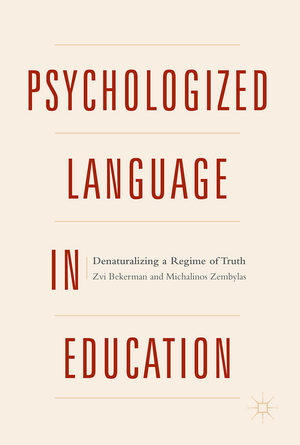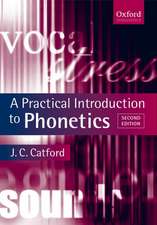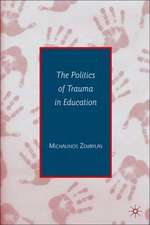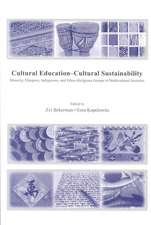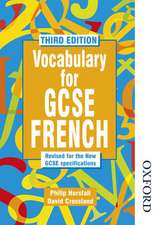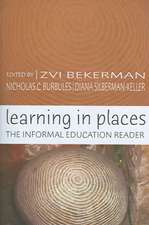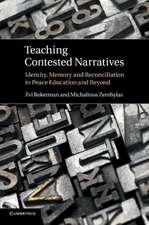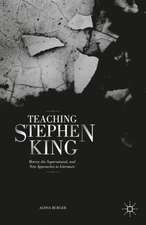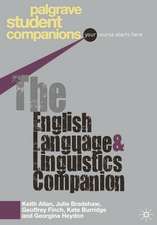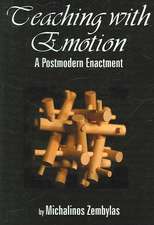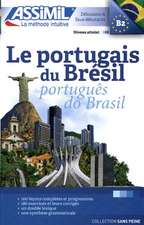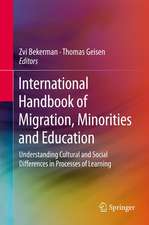Psychologized Language in Education: Denaturalizing a Regime of Truth
Autor Zvi Bekerman, Michalinos Zembylasen Limba Engleză Hardback – 3 oct 2017
Preț: 584.10 lei
Preț vechi: 687.18 lei
-15% Nou
Puncte Express: 876
Preț estimativ în valută:
111.77€ • 116.99$ • 93.03£
111.77€ • 116.99$ • 93.03£
Carte tipărită la comandă
Livrare economică 31 martie-14 aprilie
Preluare comenzi: 021 569.72.76
Specificații
ISBN-13: 9781137549365
ISBN-10: 113754936X
Pagini: 212
Ilustrații: XII, 212 p.
Dimensiuni: 148 x 210 x 20 mm
Greutate: 0.42 kg
Ediția:1st ed. 2018
Editura: Palgrave Macmillan US
Colecția Palgrave Macmillan
Locul publicării:New York, United States
ISBN-10: 113754936X
Pagini: 212
Ilustrații: XII, 212 p.
Dimensiuni: 148 x 210 x 20 mm
Greutate: 0.42 kg
Ediția:1st ed. 2018
Editura: Palgrave Macmillan US
Colecția Palgrave Macmillan
Locul publicării:New York, United States
Cuprins
1. Introduction.- 2. Schooling in the Western World.- 3. Dualisms.- 4. Mind Blowing-Blowing Mind.- 5. Individuate, Divide and Reign.- 6. The Self (Intensive Adjective or Being) Authentic, Hiding or Material?.- 7. Identity.- 8. Emotion, Emotional Intelligence and Motivation.- 9. Culture, a Modern Cage?.- 10. Making Sense of Language.- 11. Meaning not exact.- 12. The Psychologized Approach Reviewed.- 13. The Materialist Critique.- 14. Learning/Knowledge and Schooling.- 15. Abandoning Our Fixation with the Individual Mind: The Path beyond Psychologized Language.- 16. The Work of Learning, the Learning of Work.- 17. Conclusion.
Recenzii
“Psychologised Language in Education: Denaturalising a Regime of Truth is an interesting attempt to problematise the relationship between psychology and education and contribute tools to tackle the senses (or nonsenses) of education in contemporary capitalist societies. … It can also help us to recognise that the most revolutionary action that scholars and educational workers can perform is to examine our language and to face educational practice optimistically.” (Diego Palacios Diaz, Pedagogy, Culture & Society, February 11, 2020)
“Psychologized language in education is one of the most important recent contributions to educational theory in the context of contemporary social sciences and humanities, and an investment into the field of ideas aimed at transforming educational practice.” (DarkoŠtrajn, International Review of Education, Vol. 65, 2019)
Notă biografică
Zvi Bekerman is Senior Lecturer in the School of Education at The Hebrew University of Jerusalem, Israel. His main interests are in the study of cultural, ethnic, and national identity, including identity processes and negotiation during intercultural encounters and in formal/informal learning contexts.
Michalinos Zembylas is Professor of Educational Theory and Curriculum Studies at the Open University of Cyprus. He has written extensively on emotion and affect in relation to social justice pedagogies, intercultural and peace education, human rights education, and citizenship education.
Textul de pe ultima copertă
This book discusses how psychologized language has come to dominate education and schooling. It critically reviews some major constructs in education—e.g. the mind, the self, identity, emotion, emotional intelligence, motivation, culture, language and meaning—and their grounding in psychologized discourses and suggests some possible ways to overcome these psychologized discourses and remedy their consequences. The book invites readers to move away from static, reified conceptualizations to a more active, social understanding of what education is all about.
Caracteristici
Focuses on the ways that normative language/vocabulary use works to shape students’ and teachers’ perceptions of identity and difference Challenges educators to use theory, language, and concepts to think and act differently Chapters contain dialogue between the King and the Slave who debate lively various contentious issues raised in the book
